- Home
- Gore Vidal
The Golden Age: A Novel
The Golden Age: A Novel Read online
ACCLAIM FOR GORE VIDAL’s
THE GOLDEN AGE
“Prodigious research.… Superb writing … a thoroughly enjoyable read.” —The Washington Post Book World
“Vidal is at the top of his talent.… [The Golden Age’s] strength is Vidal’s superb grasp of American history.… Charming portraits are sprinkled throughout.… In many ways, the Cold War is [Vidal’s] great subject. It coincides with his own coming of age, and it suits his pugnacious, determined, unshakably cranky spirit.” —The Boston Sunday Globe
“The Golden Age is Gore Vidal’s elegiac historical novel about the twentieth century, and we seem to be in good hands.… Vidal knows the truth of things, is an excellent scholar, and was well placed to hear the gossip, near to if not in the corridors of power.”
—Diane Johnson, The New York Review of Books
“If Gore Vidal were not such a brilliantly witty and ruthlessly irreverent novelist, we would be more ready to recognize him as the fine historian he is. Nowhere among his impressive historical novels does he bring together these talents with more penetrating bravado than in this gripping and illuminating dissection of the American empire at high tide.”
—Ronald Steel
“Vidal is not only a scholar but a first-rate polemicist.”
—Chicago Tribune
“Irresistibly diverting.… If the point of good historical writing is to help us imagine a past that might have been, then it is hard to beat Gore Vidal.”
—The New York Times Book Review
“A highly entertaining read, and a real page-turner.… Vidal unleashes his final dicta on the state of the American Empire.… [He] is a Voltaire for our time.” —The Washington Times
“A worthy conclusion to one of the finest sustained historical visions in American literature.” —The New York Observer
GORE VIDAL
THE GOLDEN AGE
Gore Vidal was born in 1925 at the United States Military Academy at West Point. His first novel, Williwaw, written when he was nineteen years old and serving in the Army, appeared in the spring of 1946. Since then he has written twenty-three novels, five plays, many screenplays, short stories, well over two hundred essays, and a memoir.
THE AMERICAN CHRONICLE
by GORE VIDAL
Burr
Lincoln
1876
Empire
Hollywood
Washington, D.C.
The Golden Age
FIRST VINTAGE INTERNATIONAL EDITION, SEPTEMBER 2001
Copyright © 2000 by Gore Vidal
All rights reserved under International and Pan-American Copyright Conventions. Published in the United States by Vintage Books, a division of Random House, Inc., New York, and simultaneously in Canada by Random House of Canada Limited, Toronto. Originally published in hardcover in the United States by Doubleday, a division of Random House, Inc., New York, in 2000.
Vintage is a registered trademark and Vintage International and colophon are trademarks of Random House, Inc.
Grateful acknowledgment is made for permission to reprint “It Was a Glad Adventure,” “Hector’s Song,” “Doomed, Doomed, Doomed,” “Circe,” and “Finale: It’s the Going Home Together,” by Jerome Moross and John Latouche, copyright © 1953 (Renewed), Chappell & Co. and Sony/ATV Tunes LLC. All rights reserved. Used by permission of the heirs of John Latouche, administered by Errol Blank, and Warner Bros. Publications U.S. Inc., Miami, FL 33014.
The Library of Congress has cataloged the Doubleday edition as follows:
Vidal, Gore, 1925–
The golden age : a novel / by Gore Vidal.
p. cm.
eISBN: 978-0-307-81661-0
1. United States—History—1933–1945—Fiction. 2. United States—History—1945–1953—Fiction. 3. Newspaper publishing—Fiction. 4. Washington (D.C.)—Fiction. 5. Women publishers—Fiction. 6. Mothers and sons—Fiction. 7. New York (N.Y.)—Fiction. I. Title.
PS3543.126 G65 2000
813’.54—dc21 00-043071
www.vintagebooks.com
v3.1
Contents
Cover
About the Author
Other Books by This Author
Title Page
Copyright
Chapter One
Chapter Two
Chapter Three
Chapter Four
Chapter Five
Chapter Six
Chapter Seven
Chapter Eight
Chapter Nine
Chapter Ten
Chapter Eleven
Chapter Twelve
Chapter Thirteen
Chapter Fourteen
Chapter Fifteen
Chapter Sixteen
Chapter Seventeen
On Air
Afterword
ONE
1
Timothy X. Farrell suddenly visualized the opening shot to the film that he had planned to make of Daphne Du Maurier’s lush novel Rebecca. He had just pulled into the driveway to Laurel House, set high above the slow-churning Potomac River, and there before him in the icy silver moonlight was the start of his movie had David O. Selznick not outbid him for the movie rights and then hired Alfred Hitchcock, of all people, to direct. Plainly, a true disaster was now in the making.
Attendants parked cars in front and to the side of the mock-Georgian façade of the house of what would have been his brother-in-law, Blaise Delacroix Sanford, had Timothy and Blaise’s half sister, Caroline Sanford, ever had time to get married in those busy years when, together, they had created a film studio that, for a time, nearly changed movie history until … What was the name, he wondered, of Olivia De Havilland’s sister? The one who was now the lead in Rebecca.
Timothy parked at the front door. He could almost hear what’s-her-name’s voice over the screen: “Last night I dreamed I had gone back to Manderley”—or whatever the line was. Purest junk, of course. Timothy preferred his own “true to life” Hometown series of movies, but the public was supposed to be more at home with beautiful houses and beautiful people and a dark mystery at the heart of it all; not to mention a great fire that reveals a terrible secret. Even so, he had wanted desperately to direct Rebecca: something un-Farrellesque in every way.
The butler was since his time. “Sir?”
Timothy gave his name. Then: “Is my film crew here?”
The butler was now all attention. “Oh, yes, Mr. Farrell! This is an honor, sir. To meet you. Your camera people are setting up in the library.” The drawing room was full of Washington grandees, some elected; some born in place, like Alice Roosevelt Longworth, wearing for once the wrong blue; some newly arrived from abroad now that England and France were at war with Germany. Nevertheless, for an average American like the butler, the defining, the immortalizing presence of The Movies took precedence over everything else. “Shall I show you into the library, sir?”
“No, not yet. I must say hello.…”
Timothy had forgotten the rapid lizardlike Washington gaze when someone new enters an important drawing room. Conversations never drop a beat and all attention remains fixed on one’s group and yet the newcomer is quickly registered and placed and then set to one side, until needed. The Hollywood stare was far more honest, more like that of the doe frozen in a predator’s sight line. Fortunately, Timothy’s face was not absolutely familiar to anyone except Frederika Sanford, Blaise’s wife, who now moved swiftly through her room filled with guests, many in military uniform, some drably American, some exotically foreign, like the embassy attachés. War or peace? That was the only subject in this famous “city of conversation,” or the new phrase that Frederika used when she embraced the brother-in-law that never was: “The whispering gallery has been
roaring with the news that you were coming here to make a film.”
Frederika was now a somewhat faded version of her original bright blond self. Timothy recalled how Caroline had always preferred her sister-in-law to her half brother Blaise. But then Frederika was a born peacemaker while Blaise liked to wage war, preferably on every front. At the far end of the room he was regrouping his forces beneath a Sargent portrait of his father. Blaise was now stout; mottled of face—had he taken to drink? He looked like one of Timothy’s Boston Irish uncles. To the troops attending him, Blaise was laying down the law as befitted the publisher of the Washington Tribune, which was still the Washington newspaper despite the efforts of Cissy Patterson, whose Times-Herald, published in bumpy tandem with William Randolph Hearst, was only just—at last—making a profit.
Cissy was standing beside Blaise. She was almost as red-faced as he, and even across the room, Timothy could hear the growl of her laughter. Cissy was a reluctant supporter of the Roosevelt Administration while Blaise had been, more often than not, a critic of the New Deal. But on September 1, Germany had invaded Poland. Two days later, England and France had declared war on the aggressor; and the New Deal was history. There was now only one issue: should the United States cease to be neutral and help finance England in the war against Germany? Cissy was beginning to revert to her family’s isolationist roots; her cousin Bertie McCormick’s Chicago Tribune had already declared war on both the President and the British Empire, while her brother, Robert Patterson, creator of the New York Daily News, was, true to the family’s Irish heritage, no friend to England. Timothy himself was less provincial than these great Irish publishers, possibly because, unlike the McCormick-Patterson clan, he had been brought up poor enough to have no passionate interest in anything but himself.
“Basically,” he heard himself saying to Frederika, “it’s got to be a pretty neutral documentary. L. B. Mayer says I have to be fair to all the people who want us in the war and to all the ones who don’t. I’m not to offend a single ticket-buyer.”
“What do you want?” Frederika’s practiced vague stare suddenly focused on Timothy as he took a glass of ginger ale from a passing waiter.
“I’m neutral. Pretty much,” he added.
“Like America!” Frederika laughed. “Come say hello to Blaise. He’s delighted you’re making this film. Just as long as you do it entirely his way.”
“Which is?”
“He changes from day to day. We’ve got three thousand English people here in town, all working out of the embassy.”
“To get us into the war?”
“Splendid party, Mrs. Sanford!” A huge, dark-haired, ruddy-faced Englishman complimented his hostess while giving Timothy the swift Washington lizard’s gaze that asked two simultaneous questions: Who are you? Can I use you?
Frederika introduced Timothy to John Foster. “He’s … what at the embassy?”
“Legal Counsel is the latest title Lord Lothian thought up. Of course, it was a busy day. I gather you’re making a film about the great debate hereabouts.…”
“Word spreads,” murmured Timothy, indeed surprised that the embassy knew.
“I’m a great fan of yours, Mr. Farrell. In fact, you and John Ford are my favorites. But then trust the Irish to make the best American westerns.”
Foster moved on. Timothy laughed. “Irish! What can he mean? We don’t get much chance to ride horses?”
“You don’t like the English.” Frederika nearly frowned, something conscientious ladies of a certain age no longer dared do. “Washington is a battlefield these days.”
“Who’s winning?”
“Ah …”
Exuberantly, Blaise shook Timothy’s hand in both of his. “My favorite non-brother-in-law!”
Tactfully, the others withdrew, leaving the two men in front of the fire, whose warmth reminded Timothy of how chilly the Potomac Heights could be on what was now the historic Fourth of November, 1939, when Congress had narrowly revised the Neutrality Act, at the President’s urging. Now it was possible for belligerents in the European war—so solemnly declared and as yet so sensibly unbegun—to get arms on a “cash-and-carry” basis from what key aides of President Franklin Delano Roosevelt were now calling the Arsenal of Democracy.
“He’s going to get us into this thing. I know it. He thinks he’s another Wilson, as if the original wasn’t bad enough.” Timothy noted that although Blaise was drinking only champagne, he was, in his decorous way, drunk. Since Timothy was about to go to work, he drank only a “horse’s neck”—ginger ale with lemon twist.
“I thought you—and the Trib—are for helping the Allies against Hitler.”
Blaise’s eyes scanned the room, as though looking for someone. “Well, yes. If it comes to that. But the real enemy isn’t Hitler.”
As a onetime secret convert from Catholicism to Marxism and then onward to nothing, Timothy mentally timed Blaise’s familiar hymn, currently being chanted by every other American grandee: the real enemy of the United States, and of God himself, the two being identical and indivisible, was not Hitler and Nazism but Stalin and his irresistible creed calculated to enthrall the world’s mindless masses, godless communism, which would take away everyone’s money.
As Blaise chanted his litany, Timothy noticed a familiar figure looking out a French window at the silver river below; it was someone Timothy knew but someone who ought not to have been there, or, at least, someone he did not associate with Washington or Laurel House or politics but with … The man turned toward him and raised his hand in a near-military salute and Blaise wound up with a quick amen. “There’s Balderston,” he said. “He’s in movies, too.”
Timothy wondered what the screenwriter John Balderston was doing at Laurel House. Mike Romanoff’s Beverly Hills restaurant was more his usual venue. Recently he had written such popular films as The Lives of a Bengal Lancer and The Prisoner of Zenda. He had also been eager to work with Timothy on a film about King Arthur but Jack Warner had told them, sadly, that Errol Flynn was far too gone in alcohol “for me to lend him out. I mean, it would be just like in one of your westerns, Tim, where they give all the cows all that salt so they get so thirsty that they drink all this water to make them heavy so you can get a higher price per ton having watered your stock. Well, Flynn’s scotched his stock. I’d never loan him out to a friend.”
Warner’s humor was always on the heavy side. A relatively unscotched Flynn had then gone on to make a dozen successful films in quick succession and the King Arthur film was never made.
“You’ll be seeing Caroline, I suppose.”
“If I get to France on this trip.” But Blaise was now in deep conversation with Senator Borah, the Lion of Idaho.
Actually, if the budget was sufficient, Timothy did want to interview Caroline at home in Saint-Cloud-le-Duc, the seventeenth-century chateau where she and Blaise had grown up. Fate had so arranged matters that each was born to a mother who had died shortly after giving birth, first Blaise and then, two years later, Caroline, whose famously beautiful mother was daughter to an illegitimate son of Aaron Burr. Timothy had always wanted to make a film about Burr, who had chosen to take his stand at such an illuminating right angle to American history, but, unfortunately, no studio would touch the story of a man mistakenly thought to be a traitor.
The amiable Balderston was more like an Englishman than an American, the result, Timothy assumed, of his years as a London-based foreign correspondent. “I know what you’re doing here.” Balderston’s upper plate at least had a professional American look to it, fully adhesive and not too dazzlingly British white.
“And I don’t know what you’re doing here.” Timothy obligingly completed the dialogue.
“Well, I’m not making a film about …” He indicated the room. “But I wish I were.”
“Have you chosen sides?”
Balderston put a cigarette in an ivory holder, rather like the one the President affected. “Well, I’m prone to the British, I suppose.
But since you’re Irish …”
“I’m not prone to the British. I’m not anti either, since my family left the bogs of our ancestral island. On the other hand, I’m anti-Hitler.”
“I half-heard Mr. Sanford lecturing you. I hadn’t realized that communism is so much worse than Hitler.”
“Rich Americans all sound like that this season.”
“Do you think they believe it?” Balderston was oddly urgent.
“I wouldn’t know.” Timothy felt himself cut loose in deep waters. What was going on this night at Laurel House?
“You were married to Caroline Sanford, weren’t you?”
“We kept, as they say, company. Not quite the same thing.”
“Sorry.” Balderston actually blushed. Then he looked about him. “Anyway, here’s the real—not the phony—war. In this room. There’s Senator Borah, taking money from the Nazis to pay for his isolationist line.”
Timothy was never shocked by what film producers or even politicians did, but for a senator to take money from a dictator like Hitler was, perhaps, going too far. “I’ve known the Lion of Idaho for over twenty years.” Timothy was mild. “He’s a total isolationist. Why would he take money for doing and saying what he does and says anyway?”
“I defer,” said Balderston, “to your long years, in and out …”
“Mostly out.”
“… of this Jacobean court.”
“Jacobean?” Timothy found the adjective inappropriate for something as essentially mundane as the American political system. “Will there be poisonings? A sword through the tapestry? Statesman murdered in a bathtub?”
Balderston laughed. “Nothing so good, I’m afraid. But even so, I’ve counted three Axis agents here tonight.”
“How many British?”
“Only John Foster, and he’ll tell you everything that he is trying to do to get us into the war, with absolutely no success. Then, if all else fails, he does a nice imitation of Senator Borah. John is a model spy.”

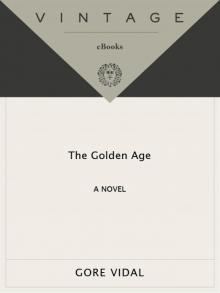 The Golden Age: A Novel
The Golden Age: A Novel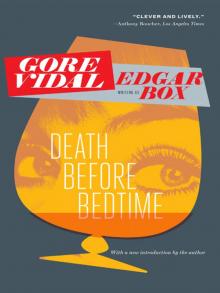 Death Before Bedtime
Death Before Bedtime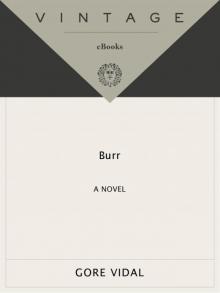 Burr
Burr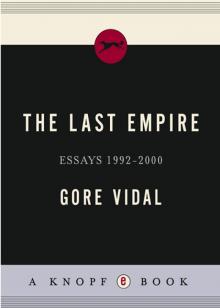 The Last Empire
The Last Empire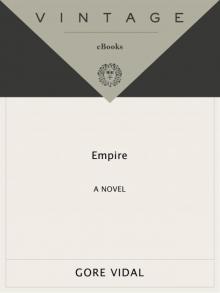 Empire: A Novel
Empire: A Novel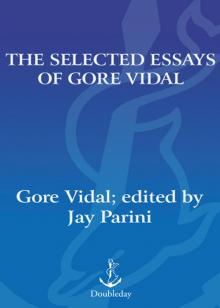 The Selected Essays of Gore Vidal
The Selected Essays of Gore Vidal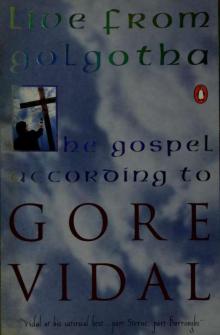 Live From Golgotha
Live From Golgotha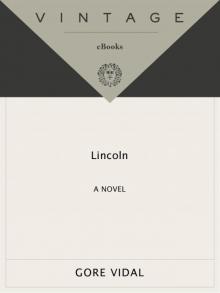 Lincoln
Lincoln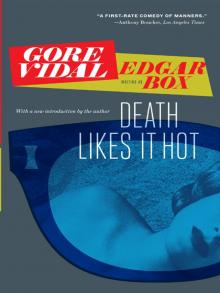 Death Likes It Hot
Death Likes It Hot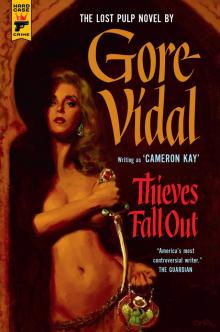 Thieves Fall Out (Hard Case Crime)
Thieves Fall Out (Hard Case Crime)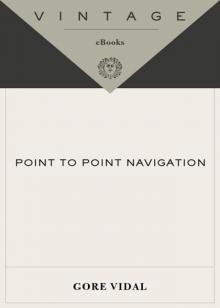 Point to Point Navigation
Point to Point Navigation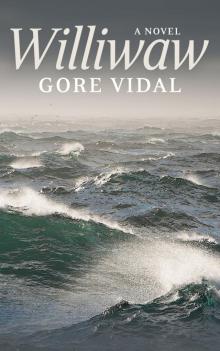 Williwaw
Williwaw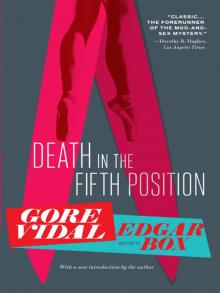 Death in the Fifth Position
Death in the Fifth Position In a Yellow Wood
In a Yellow Wood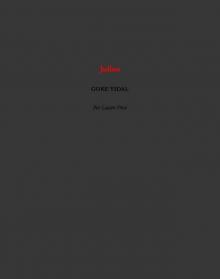 Julian
Julian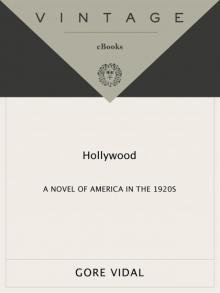 Hollywood
Hollywood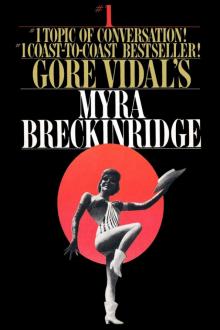 Myra Breckinridge
Myra Breckinridge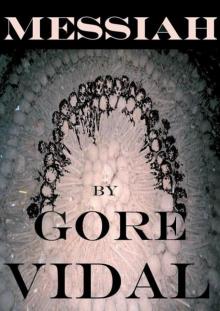 Messiah
Messiah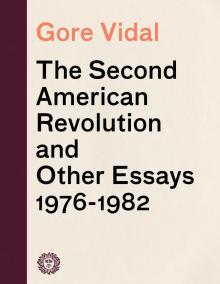 The Second American Revolution and Other Essays 1976--1982
The Second American Revolution and Other Essays 1976--1982 Homage to Daniel Shays
Homage to Daniel Shays Empire
Empire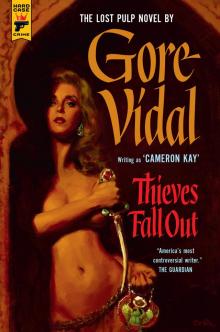 Thieves Fall Out
Thieves Fall Out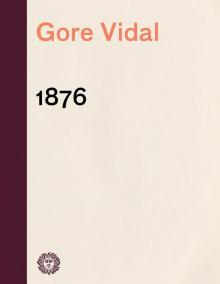 1876
1876 The City and the Pillar
The City and the Pillar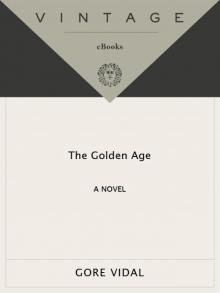 The Golden Age
The Golden Age At Home
At Home